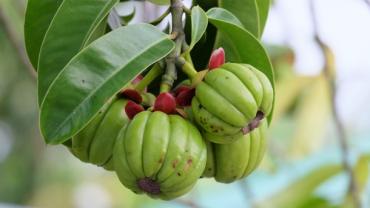
Anyone who’s fought their body weight—and lost repeatedly—knows that diet and exercise alone aren’t always enough to bring the desired results. Struggling to lose body fat, especially when someone has already changed their diet and lifestyle, can be disheartening and demoralizing. And while diet and exercise are still the foundation of a fat loss program, when results are lackluster, there are nutraceutical compounds that can offer a little boost and provide a slight bit of extra ammunition in this most difficult of battles. Old standbys include L-carnitine and green tea extract. One that gets less attention is Garcinia cambogia.
The dried fruit rind of Garcinia cambogia, also known as Malabar tamarind, is a source of hydroxycitric acid (HCA), which has been used for centuries in Southeastern Asia to prepare more filling meals. (Garcinia cambogia has a sour flavor that is often included in curry dishes.) HCA has been demonstrated to inhibit ATP-citrate lyase, a key enzyme in fatty acid and triglyceride synthesis, and is effective in weight management in experimental animals and in humans. This unique ingredient found in Garcinia cambogia favors the storage of glucose as glycogen in the muscles and liver rather than storing it as triglycerides in adipose tissue. The bottom line: less sugar is stored as fat and more fat is disposed from the body.
Extracts of Garcinia cambogia (GC) and HCA, the fruit’s main organic acid, exhibit “anti-obesity activity including reduced food intake and body fat gain by regulating the serotonin levels related to satiety, increased fat oxidation and decreased de novo lipogenesis.” In vitro and in vivo models have also shown GC extract to be anti-inflammatory, hypolipidemic, anthelmintic, and hepatoprotective.
When mice were fed an obesity-inducing high-fat diet, GC reduced body weight gain, visceral fat accumulation, blood and hepatic lipid concentrations, as well as plasma insulin and leptin levels. Researchers speculated that these effects were likely induced by GC “modulating multiple genes associated with adipogenesis […] in the visceral fat tissue of mice.”
Okay, that’s nice, but it was in mice. What about humans?
Data from human trials show GC has a small but significant impact on fat oxidation and body weight. And considering just how difficult it is for many people to get rid of stubborn body fat, any possible edge is usually welcome. In 60 human subjects given a 2,000 kcal/day diet, who also participated in a walking exercise program and were given a placebo or supplement providing 2,800 mg HCA/day in three equally divided doses 30-60 min before meals, body weight and BMI decreased by 5.4% and 5.2%, respectively, at the end of the 8-week study. “Food intake, total cholesterol, LDL, triglycerides and serum leptin levels were significantly reduced, while HDL and serotonin levels, and excretion of urinary fat metabolites (a biomarker of fat oxidation) significantly increased.”
Garcinia cambogia seems to be helpful for targeting abdominal obesity—the visceral fat that is believed to be more harmful than subcutaneous fat elsewhere in the body. In a study of overweight adults (BMI ≥ 25 kg/m2) with visceral fat area > 90cm2, 12 weeks of supplementation with 1667 mg of Garcinia cambogia extract containing 1000 mg HCA per day (taken in divided doses before three daily meals) resulted in slight decreases in body weight and BMI, but only in men. At 12 weeks, both body weight and BMI were numerically but not significantly lower in the GC group than in the placebo group. Compared to placebo, GC resulted in significant decreases in visceral fat and total body fat, which underscores the importance of distinguishing between weight loss and fat loss. This study doesn’t cement GC as a go-to intervention for fat loss, but again, some individuals must fight tooth and nail for every ounce lost. These dieters—disciplined and dedicated, yet unsuccessful—may benefit from any possible edge.
To be fair, other data show GC to be no more effective than placebo for facilitating weight loss. In a study in which overweight subjects were given 1200 mg of HCA per day or placebo for twelve weeks, the amount of weight lost and the percentage of body fat lost showed no significant differences between the active compound and placebo. (Both groups did lose weight, but the differences between the two were not significant.)
Disparate findings may have to do with dosages of Garcinia cambogia extract not being standardized for HCA content, and for different doses being used in different studies. A review of GC as a weight loss aid found that some studies show efficacy for appetite reduction and reducing body fat percentage, triglycerides, cholesterol, glucose levels, and lipogenesis, while other studies fail to support these effects. It’s also possible that some subjects respond to GC or HCA, while others do not, and most of the human trials looking at GC have been relatively small, so the sample size as a whole might not be large enough to determine effects with certainty.
Like any compound shown to potentially reduce abdominal fat accumulation and help with weight management, GC isn’t likely to be a slam-dunk on its own. It’s probably not going to work miracles in the absence of any other changes to diet, exercise, sleep patterns, and other factors. But used in combination with other nutrients and compounds known to help boost fat loss and support a healthy metabolic rate, GC could be a helpful for patients struggling to lose fat in the context of a healthy diet.